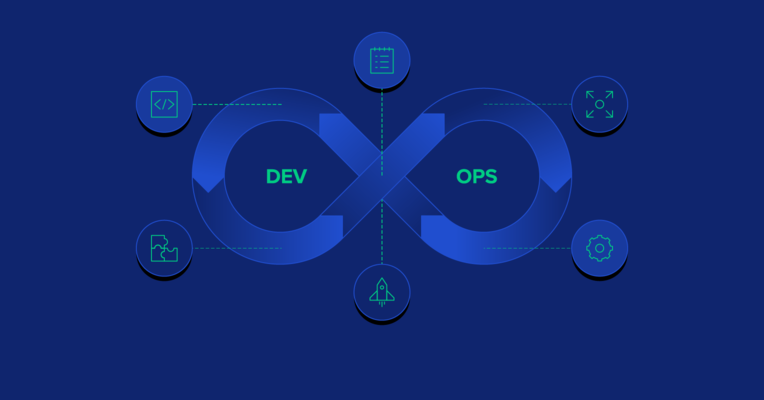
DevOps Engineer Job Description Template
A DevOps engineer and architect works with software engineering to optimize and improve the performance and implementation of the development process. Often DevOps engineers streamline and automate processes while troubleshooting existing development procedures.
Trusted by leading brands and startups
DevOps is an integral part of many companies’ infrastructures. It combines development with operations with the aim of reducing the cost and turnaround time of tech projects, while improving the ability to maintain their infrastructure.
DevOps Engineer - Job Description and Ad Template
Copy this template, and modify it as your own:
Company Introduction
{{ Write a short and catchy paragraph about your company. Make sure to provide information about the company’s culture, perks, and benefits. Mention office hours, remote working possibilities, and everything else that you think makes your company interesting. }}
{{ It is very important to give a precise description of the technology stack that the company uses. While a lot of skills translate nicely between clouds and DevOps positions, others don’t. Engineers may also have preferred cloud or technology stacks they choose to work in. }}
Job Description
{{ Despite the maturity of DevOps, not all companies have moved to a DevOps-centered structure yet. Plus, almost as important as your tech stack is the context you’re hiring for: You’ll want to select from the three alternatives below depending on your company’s needs. }}
{{ For an established DevOps practice. More often than not these companies started in the cloud: }}
We are looking for an experienced engineer to join our DevOps team with experience building and scaling services in a cloud environment. You’ll be working with {{ describe your team size and who the candidate would report to here. }}
{{ For establishing on-premise DevOps practices. Oftentimes companies in this bracket are eyeing the cloud but may not yet use it, because of existing infrastructure, data security, or cost requirements: }}
We are looking for an experienced DevOps engineer that will help our team establish DevOps practice. You will work closely with the technical lead {{ and/or CTO }} to identify and establish DevOps practices in the company.
You will establish configuration management, automate our infrastructure, implement continuous integration, and train the team in DevOps best practices to achieve a continuously deployable system.
{{ For establishing DevOps in a new startup: }}
We are looking for an experienced DevOps engineer that will help our team establish DevOps practice. You will work closely with the technical lead {{ and/or CTO }} to identify and establish DevOps practices in the company.
You will help us build scalable, efficient cloud infrastructure. You’ll implement monitoring for automated system health checks. Lastly, you’ll build our CI pipeline, and train and guide the team in DevOps practices.
Responsibilities
{{ Again, select from the three alternatives below depending on your company’s needs. }}
{{ For an established DevOps practice: }}
- Improve CI/CD tooling.
- Implement and improve monitoring and alerting.
- Build and maintain highly available systems.
- {{ Add the most relevant company specifics here. }}
{{ For establishing on-premise DevOps practices: }}
- Implement the CI pipeline.
- Implement and maintain monitoring stacks.
- Lead and guide the team in identifying and implementing new technologies.
- {{ Add the most relevant company specifics here. }}
{{ For establishing DevOps in a new startup: }}
- Implement and own the CI.
- Manage CD tooling.
- Implement and maintain monitoring and alerting.
- Build and maintain highly available production systems.
- {{ Add the most relevant company specifics here. }}
Skills
{{ DevOps is not system administration although a lot of skills may or may not overlap. Good Linux skills are always a valuable addition even if they’re not necessary for the job. }}
- {{ If the job is exclusively using, orchestrating and optimizing cloud components, Configuration Management experience may not be necessary. For OnPrem this skill is almost always necessary. }} Configuration Management experience such as Ansible, Chef, Puppet, or similar.
- {{ For cloud environments, establishing new DevOps practices: }} Managing production infrastructure with Terraform, CloudFormation, etc.
- {{ If the Job requires Configuration Management: }} Strong Linux {{ and/or Windows }} system administration background.
- {{ For establishing new DevOps practices: }} Ability to present and communicate the architecture in a visual form.
- {{ For cloud environments: }} Strong knowledge of {{ AWS, GCP, or Azure }}
- {{ Candidates should ideally have experience in your tech stack or something comparable. For a better understanding of how to hire for your tech stack, please see Toptal’s tech-specific resources. }}
Recent DevOps Articles by Toptal Engineers
How to Hire DevOps Engineers
With the complexity of modern software, the deployment process can be a challenge. DevOps engineers ensure smooth and reliable delivery through automation, collaboration, and continuous feedback. This hiring guide walks you through how to find and evaluate the right DevOps engineer for your project.
Read Hiring GuideFind the right DevOps interview questions
Read a list of great community-driven DevOps interview questions.
Read them, comment on them, or even contribute your own.
Hire a Top DevOps Engineer Now
Toptal is a marketplace for top DevOps engineers and developers. Top companies and startups choose Toptal DevOps specialists for their mission critical software projects.
See Their ProfilesDmitry Kireev
Dmitry is a cloud architect and site reliability engineer with over a decade of intense professional experience strictly adhering to the DevOps methodology. He has architected and built multiple platform-agnostic infrastructures from scratch for modern cloud systems. Dmitry has a proven track record of hands-on operations in high-scale environments. He is also proficient with IaC, automation, and scripting, as well as monitoring and observability.
Show MoreSagi Kovaliov
Sagi is a top-performing, Microsoft Certified Senior Azure DevOps engineer with ten years of solid hands-on experience in DevOps, programming, scripting, and business intelligence. Sagi specializes in architecting and implementing DevOps processes using Azure DevOps and Azure Cloud platforms. By utilizing his gained experience in multiple application development areas, Sagi has become one of the most prominent experts in the market.
Show MoreArthur Lorotte de Banes
In 2012, Arthur earned a master's degree in computer engineering but he soon learned his true north was in system administration. His programming background has helped him automate most of his tasks along the way and he eventually ended up in cloud computing as it gave him even more possibilities. Arthur is a full-stack DevOps who has particularly strong development skills with all things AWS—which his numerous certifications can attest to.
Show MoreKeidrych Oates Anton
Keidrych is a cloud architect who guides organizations through the quagmire of multi/poly-Cloud Native Computing Foundation (CNCF) technologies so their technological foundation may be secure to all, reliable for customers, and monetarily efficient, leveraging scorched earth capabilities toward zero production impact on plant-scale architecture. Keidrych believes trusted technology serves humanity; a 5% increase in internet or cyberspace trust results in a $3,000+ increase in GDP per capita.
Show MoreRyan Cocks
Ryan is an experienced software engineer of reliable and scaleable production Cloud systems. He specializes in DevOps, microservices, architecting applications, and application-level observability. He has a solid background in Cloud infrastructure and back-end work. He has good soft skills and has worked in teams of all sizes. Ryan has an excellent ability to understand the business needs behind requirements.
Show MoreMike Stankavich
Mike is a senior data engineer and freelance architect experienced across the development stack. He has extensive cloud and infrastructure experience, with multiple certifications from Microsoft, ISC2, Powersoft, and more. He currently builds data back ends for web apps at scale on RDBMS or NoSQL platforms.
Show MoreFernando Eugenio Marcos Teixeira
Fernando is a technology enthusiast with more than ten years of experience in IT, seven of which are in AWS-built environments. Always driven by measurable metrics and big value efforts, he is a generalist with a great capacity and focus on aggregating context and can take deep dives into specific topics when problems arise and solutions are needed. Fernando believes leading by example and attentively coaching is the only way to multiply the impact on an organization.
Show MoreFredrik Håård
Fredrik is a developer with over twenty years of contracting and entrepreneurial experience. He specializes in back-end product development, lifecycle maintenance, and secure data handling and operations in everything, from cluster implementations in charging systems to full-stack product development for one-person startups.
Show MoreDiscover More DevOps Engineers in the Toptal Network
Start HiringToptal Connects the Top 3% of Freelance Talent All Over The World.
Join the Toptal community.



















